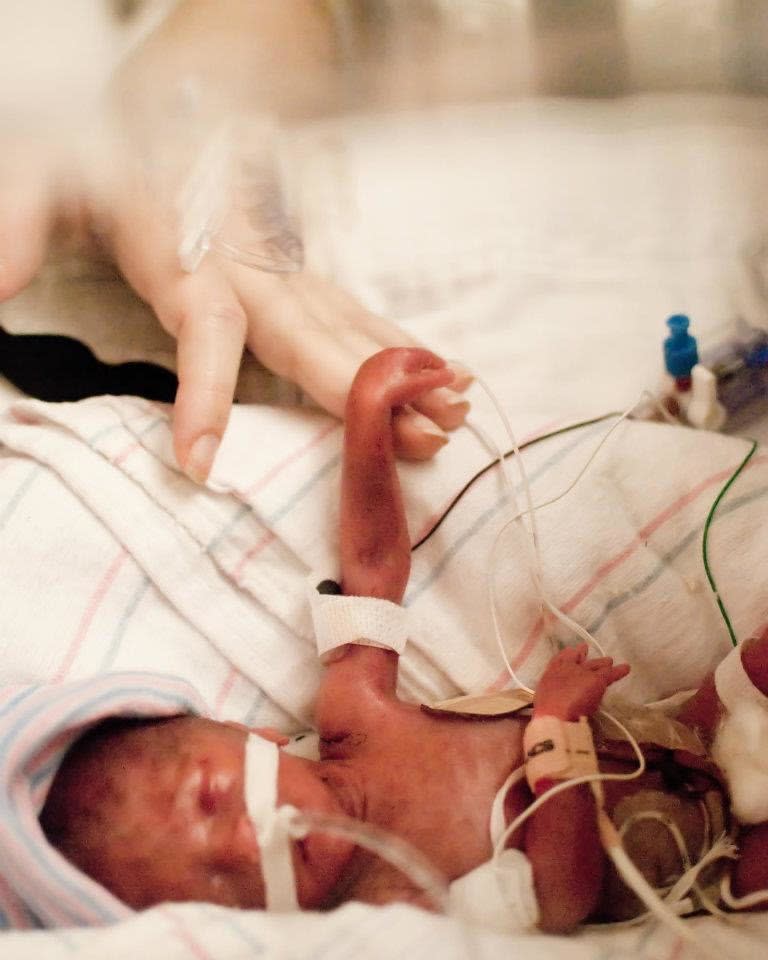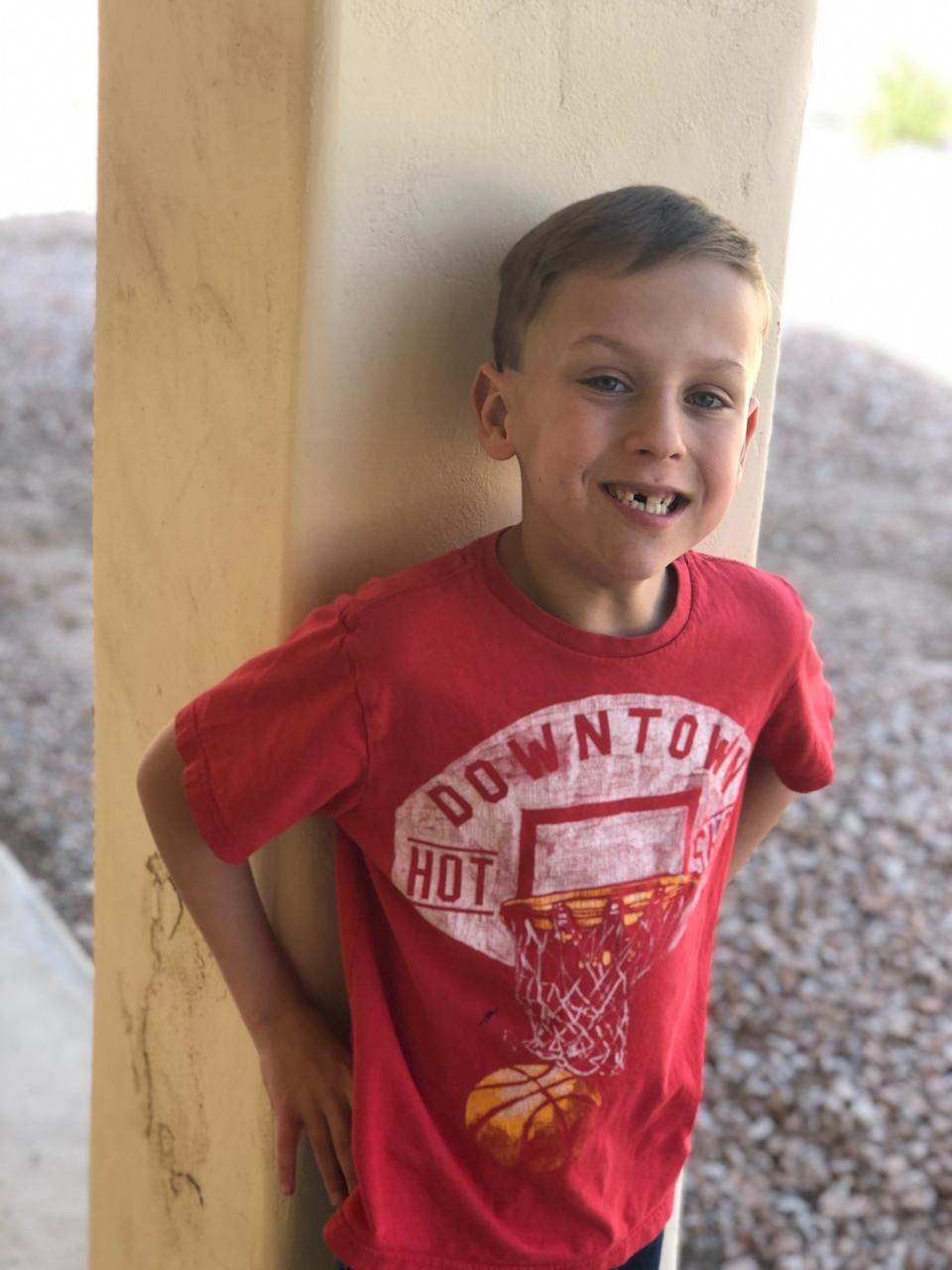Having a NICU Baby Is Its Own Trauma
Elizabeth Wieland is a stay-at-home mom and part-time preschool teacher in Phoenix, Arizona. Seven years ago she and her husband Jon endured one of life’s most unexpected and painful journeys: a pregnancy loss of one of their twins and a nearly four-month stay in the neonatal intensive care unit (NICU) for their surviving son Jacob. Even though Jacob’s birth was a bright spot, memories of their time in the NICU still haunt them. This is their story, as told to Rachel Wells.
When my husband and I found out we were pregnant with twins, we were thrilled. We had been through two healthy pregnancies already—we knew the drill. But one day, while standing at the kitchen table working on a project with one of my boys, I felt something strange, almost like a pop or a tiny gush, in my abdomen. Something was wrong.
My husband and I went to the hospital, but they sent us home telling us not to worry—everything looked fine for my 16-week pregnancy. We had no idea until the 20-week ultrasound that the pop I’d felt was my water breaking for one of the twins. I was immediately put on bed rest and given a list of homework: check my temperature a few times a day, check for infection, drink a ton of fluids. With two kids already at home, it was a big task, but we were managing. But after four weeks of being on bedrest, the unthinkable happened: I started bleeding.
After rushing to the hospital again only to be sent home with another non-diagnosis, we ultimately returned to learn that Twin A had “demised.” I was shattered, the clinical terminology further splintering my heart.
Baby A hadn’t demised—my son had died.
"OK, Stay Pregnant"
Still in shock, we were sent home, but that evening the bleeding returned, so we rushed back to the hospital yet again, terrified about the safety of the second fetus in my womb. I was admitted for closer monitoring, unsure how many of the remaining 24 weeks of my pregnancy I'd spend in a hospital bed. Every night when the nurses came to check on me, they would say, “OK, stay pregnant.” Yeah, I’m trying here, I thought.
Still in the hospital, still on bed rest, and now 23 weeks pregnant, I was feeling sick all the time. There were no signs of contractions, so my nurses believed my pain was just indigestion. But one night, after hobbling to the bathroom, I realized something much more serious was happening. After frantically buzzing my nurse, I learned my body was beginning to deliver the fetus of the demised twin. My son, the baby we’d already named Joel, was being born.
Throughout the night, the next day, and the following evening, I experienced contractions until baby Joel was delivered stillborn. I chose not to hold his body. It’s one of the biggest regrets of my life, but at the time it felt like the only way to hold onto my quickly eroding sanity. I needed every ounce of strength I could muster for Twin B, our son Jacob, who was still growing inside me.
For a few precious days, everything was calm. Then Jacob’s water broke and at 23 weeks—just past the point of viability—my husband and I decided with our doctor it was time to have a C-section. I thought we were past the worst part, but as soon as Jacob was born, he was taken to the NICU—it would be his home for the next 115 days and an entirely new type of trauma for me.
Out of Bed and Into the NICU
The NICU never leaves you. As soon as you walk through the automatic doors, the smell of disinfectant and loss works its way into your skin, imprinting itself in your memory.
Once the nurse at the front desk clears you, you walk down a long hallway to your baby's room. You might make it a foot or two before a nurse starts bombarding you with updates—how he’s breathing, how he slept the night before, and what medications were being added or changed. The news always felt like an assault on my mind—I just wanted to see my baby, watch him breathing, hear his heart beating, before I could process any of it.
When I did finally make it to Jacob’s room, often with a pillow or overnight bag in hand, it always felt as though the number of people in the room was multiplying before my eyes. It felt like 30 people were in there, like the room was spinning, like my mind was about to explode.
Sitting there, mind slowly numbing to the alien beeps and buzzes of an entire roster of machines, is torture. When you visit your baby, nurses tell you to pay attention to your child—not the monitors. I’d try really hard to listen to their advice, but the noise made it impossible to relax—each blip could signal the end of the world.

There were days Jacob did really well and days he didn’t. He’d wean off the ventilator, then go back on, then go off again. He had countless tests and scans measuring the development of all the vital systems that hadn’t had time to finish growing inside me. Each test was like purgatory—my husband and I went through the motions of our lives without breathing, just waiting for good news.
In the meantime, I felt the weight of an entirely different kind of pain: all the important firsts I was missing with my son. One evening I went into the NICU and a nurse I hadn’t met before told me she gave Jacob his first tub bath and put him in his first onesie. My stomach sank. Even though we were thankful for the medical staff, those moments still hurt.
It’s not that I didn't want my baby to be taken care of; I did. It just became blindingly obvious it wasn't me taking care of him. The daily distance from my son, the difficulty of having to make medical decisions while exasperated and exhausted, and the unrelenting possibility of my worst fears coming true at any moment—it was like living in the dark. There’s no escape and no light—during the fleeting moments of good news I still feared what might be around the corner.
Learning to Heal

After nearly four months in the NICU, it was time to bring our baby home. It took three years for our life to feel close to normal and six years to get perspective on the journey we'd been through.
As traumatic as the pregnancy, NICU, and recovery were, these weren’t the only things happening in our life. We were busy, we got pregnant again, and our boys kept growing. We found reasons to smile, but the memories never stop haunting you. My fourth pregnancy was filled with stress, paranoia, and angst. May 12th, the day I delivered Joel, is really hard for me every single year. In fact, it wasn’t until last year, with baby Zeke, that I had a bit of peace surrounding that day. He brings perspective to things I don't think I would’ve of gotten otherwise.
Time doesn't heal all wounds, but it does soften them. Jacob is turning seven soon and he’s proud of his journey. This year for show-and-tell in his kindergarten class, he brought his story, a hardcover book we made from our NICU Facebook posts; his first blood pressure cuff, so small it could fit on your index finger; and his first diaper, the size of a cotton ball. Jacob is a triumph and his bravery never ceases to amaze us.
Just now, I feel a tug on my shirt, “Mom, when does my story come out?” Not one to back down from a challenge, he’s ever ready to shine his light.
Rachel Wells is a writer in Nashville, Tennessee, covering women’s rights, health and wellness, and arts and culture. Follow her on Twitter at @rachelwells and on Instagram @rachelwells1.

